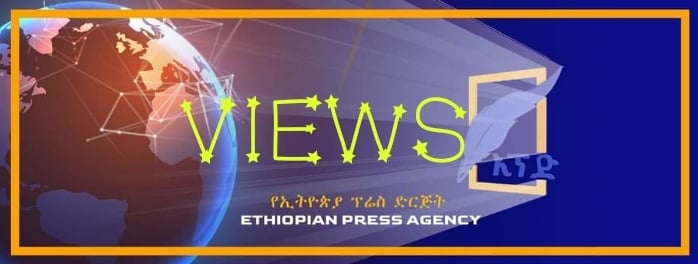
BY GETACHEW MINAS
Political analysts think that “perception is reality in politics” The real performance of political parties could be analyzed using conceptual distinctions between “democracy as a means of interest optimization, democracy as a way of fostering civic orientation among citizens, and democracy as a mechanism of popular choice and control of government.” Based on the first two distinctions, Paul Webb points out that parties appear to be largely failing democracy, but they remain important mechanisms by which a significant degree of popular choice and control can be achieved. However, it is believed in Ethiopia that they are “more” challenged and less appreciated than was once the case.
This may reflect “changes” in popular perception in the country than a shift in the real performance of parties. That being the case, it is not clear if institutional reforms in Ethiopia that aim to improve party performance will necessarily achieve their goal.
Political parties in Ethiopia, as in so many other developing countries, are seen as disappointing in their performance. Some of them even fail to fulfill the requirements to register as parties. Moreover, there is evidence of detachment, alienation, indifference, boredom and apathy among citizens regarding political parties. There is, therefore, an urgent need to study the causes of public disappointment in political parties. There is also an urgent need for explanations and for means to put things right. Normally, the blame for such political crises is piled on several groups. These are parties and politicians that operate secretly. Thus, the political system is bound to face criticism from several quarters. Also, the blame lies on the mass media, and occasionally even on the public itself. Studies should examine the nature and causes of public discontent and disappointment by addressing the failings of political parties and interest groups “real and perceived.”
To what extent one classifies parties as failing depends largely on his/her perception of democracy. In this regard, observers consider it useful to identify basic elements of democracy. The first democratic element is interest optimization, the second civic orientation, and the third popular choice and control. These three perspectives are used to analyze the current performance of parties in the developing countries to find out if they are failing. With regard to interest optimization, the political party has to be democratic, and for that “rules or procedures” must be employed to bring about results. These outcomes promote or defend the interests of the largest number of people involved. From this perspective, there are basic roles of parties in fostering democracy. These roles focus indirectly on the political functions of expression and combination of interests. Any failure in fulfilling these roles relegates parties as incompetent.
In party politics there is an increasing role of “interest groups” as articulators of perceived public demands. For some, this represents a major challenge to parties, as it reflects their failure to perform their perceived but unrealistic goals. Interest groups, however, are problematic from the perspective of political parties. They tend to take drastic measures as organizations than parties. The increasing number of single interest associations is part of the problem for the aggregation of related interest groups. However, in any democratic political system, political parties have to bring together several group interests into coherent policy packages. This process involves prioritization of interests and generates coalitions of support. This is essential to the effectiveness and stability of the political system. But, politicians are quick to note the problems caused by an explosion of interest groups which is not matched by a rise in “accommodative” capacity of a political system.
Studies have confirmed that the expansion of political agendas to accommodate new debates over social development, economic progress, environmental quality, multiculturalism and other social and cultural issues make it very difficult for governments to satisfy most of the people most of the time. However, it is difficult to see any alternative or a substitute to a political party for the aggregation of political demands. Single issue groups may rival parties addressing several issues, but they are not able to bring together a multiplicity of interests into a coherent program. Thus, interest “aggregation” remains a major but difficult party function. It is virtually impossible to satisfy people’s demands in an optimal way, unless policy is made in pure two party contexts, but this is unrealistic in Ethiopia as there are so many parties contending for power to lead the country to prosperity.
The second element of democracy is “civic orientation.” Democracy is not fully realized until citizens express their shared interests. Participation in the democratic process is vital to the political enlightenment of citizens if they are to develop civic orientation. Activists have, therefore, placed political participation and enlightenment high on their criteria for the evaluation of democracy and its institutions. Also, the aggregation of demands which expresses the public interest is important to this approach.
Contemporary political parties in the developing countries, including Ethiopia, are unlikely to perform well by these criteria of standards. In addition, there are a number of issues to be raised. It might be argued that parties are inimical since they tend to articulate and foster narrow group interests to the detriment of the wider community. It can be argued that contending parties in a country can do little to instill such notion of civic orientation.
With focus on parties in the real world of today, the vision of a one and indivisible people is a high standard, which is not realistic and, therefore, unnecessary. Political scientists agree that there has never been a time since the onset of democracy when one could say that it was fully realized. And yet there was clearly a time when parties and political elites were more “favorably” looked upon by the people in both the developed and developing countries. This, however, does nothing to help understand why parties have fallen into such disfavor in the real world of today. But, any kind of community consciousness, including group identity based on region, class, religion or ethnicity, may qualify as existing in the current real world. In this situation, parties play a central role in fostering such community identities in many countries, including Ethiopia.
The demise of identity politics and mass parties based on social groups or religious denominations is currently reviving from its dormant situation. Some citizens now feel themselves to be wedded to particular parties as an expression of social identity and interest. Their perceptions of social interest depend critically on the presentation of politics by the mass media. The political parties may “not” be able perform the role of the media in the social integration of certain groups or citizens.
Consequently, parties become more vulnerable to the impact of political mass media that converts the perceptions of parties into a reality. This is caused by the “failure” of political parties to channel and foster political participation of the party members and the people at large. It is possible to point to the increased participatory rights which parties have offered their members to elect leaders. But, it is not possible to ignore the decline in membership.
Decline in membership has been a threat to the survival of political parties in the developing countries. Most of the registered electors were members of the major parties with nationwide branches. By the time of the general election, less than a few percent were able to vote. The tremendous decline of membership has been the result of diminishing levels of party activism, declining level of interest in politics and disinterest of party apparatchiks.
Electoral turnout appeared to have moved in the same direction. All of this suggests that political parties are at best irrelevant, at worst downright uncontrolled, obsessive and irrational. It is not surprising that one of the major sources of attack on parties today comes from the party members and alternate leaders that move against party programs. These are mainly aspirants that failed to secure real power within the party hierarchy.
The alternate party leaders who failed to rise to the apex of power argue that the solution to the perceived problems of democratic systems lies in the absence of participatory opportunities. They propose that political reforms must provide for greater direct engagement in politics. Those who failed also argue that the political system has failed to keep pace with social changes and developments. As it is managed by elites detached and disengaged from those they are supposed to serve, many of party supporters are, therefore, turning away from politics altogether. The solution to this problem may be the creation of a “culture” of political engagement in which leaders and decision makers extract direct input from citizens.
The citizens may be given the right to “initiate” legislative acts, public inquiries, reviews and hearings. In this regard, Information Technology/IT may allow citizens to directly participate in political decisions.
Despite efforts by political parties, there is a trend in political apathy, cynicism and declining participation by citizens. But, politicians desire for profound and widespread political commitment of the people. The principal reason for growing political disaffection among Africans, including Ethiopians, is the rising expectation they have of governments that could not satisfy the needs of the people.
People’s demands are difficult to satisfy with meager productive resources that are at the disposal of the state. The tax base is narrow and revenues of governments are not enough to meet the demands of people. Moreover, the abuse of power and misuse of scarce resources by the bureaucrats discourage the citizens. People lose faith in the politicians that failed to correct the civil service they guided while in power. Unfortunately, the politicians seemed to encourage corruption and theft while they were in power. They might “not” perceive of coming to power through re-election.
These perceptions are real and most pronounced among the young, the better educated and the more affluent. These are likely to benefit from the spread of affluence. Their expectations increase the most, as their tendency to criticize political elites, institutions and processes are on the rise. The purpose of their criticism is to discredit the political entities before election and claim access to power. Authority and power in Africa, as well as Ethiopia, is a useful means of amassing wealth. Most of the young political aspirants want to have access to power to distribute a nation’s wealth to party apparatchiks, friends and relatives through appointments at all posts of government. These posts are instrumental in accessing resources of the country by the party officials. They do not represent a threat to neither the ruling party nor the leader.
Editor’s Note: The views entertained in this article do not necessarily reflect the stance of The Ethiopian Herald
The Ethiopian Herald 20 August 2022




